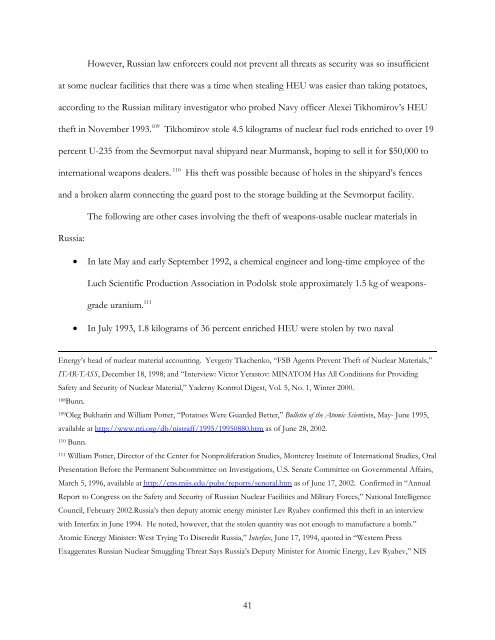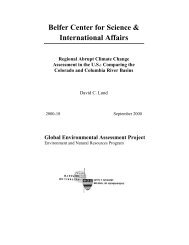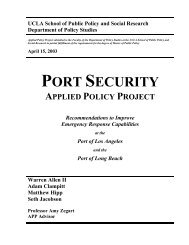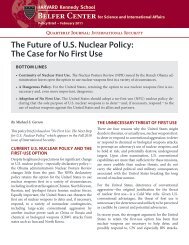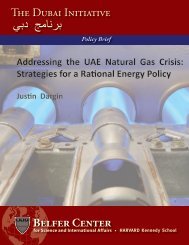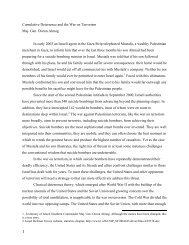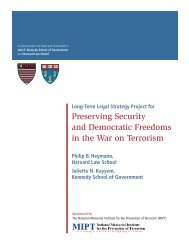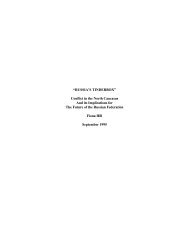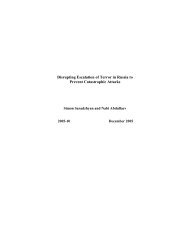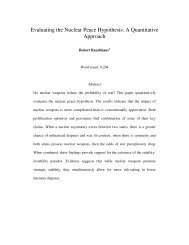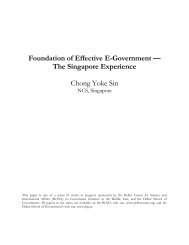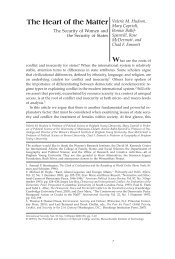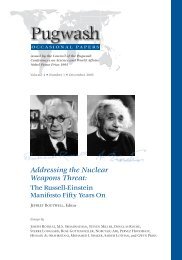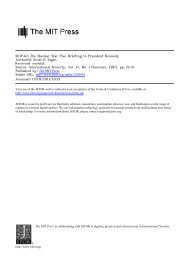Russia - Belfer Center for Science and International Affairs - Harvard ...
Russia - Belfer Center for Science and International Affairs - Harvard ...
Russia - Belfer Center for Science and International Affairs - Harvard ...
Create successful ePaper yourself
Turn your PDF publications into a flip-book with our unique Google optimized e-Paper software.
However, <strong>Russia</strong>n law en<strong>for</strong>cers could not prevent all threats as security was so insufficient<br />
at some nuclear facilities that there was a time when stealing HEU was easier than taking potatoes,<br />
according to the <strong>Russia</strong>n military investigator who probed Navy officer Alexei Tikhomirov’s HEU<br />
theft in November 1993. 109 Tikhomirov stole 4.5 kilograms of nuclear fuel rods enriched to over 19<br />
percent U-235 from the Sevmorput naval shipyard near Murmansk, hoping to sell it <strong>for</strong> $50,000 to<br />
international weapons dealers. 110 His theft was possible because of holes in the shipyard’s fences<br />
<strong>and</strong> a broken alarm connecting the guard post to the storage building at the Sevmorput facility.<br />
<strong>Russia</strong>:<br />
The following are other cases involving the theft of weapons-usable nuclear materials in<br />
• In late May <strong>and</strong> early September 1992, a chemical engineer <strong>and</strong> long-time employee of the<br />
Luch Scientific Production Association in Podolsk stole approximately 1.5 kg of weapons-<br />
grade uranium. 111<br />
• In July 1993, 1.8 kilograms of 36 percent enriched HEU were stolen by two naval<br />
Energy’s head of nuclear material accounting. Yevgeny Tkachenko, “FSB Agents Prevent Theft of Nuclear Materials,”<br />
ITAR-TASS, December 18, 1998; <strong>and</strong> “Interview: Victor Yerastov: MINATOM Has All Conditions <strong>for</strong> Providing<br />
Safety <strong>and</strong> Security of Nuclear Material,” Yaderny Kontrol Digest, Vol. 5, No. 1, Winter 2000.<br />
108 Bunn.<br />
109 Oleg Bukharin <strong>and</strong> William Potter, “Potatoes Were Guarded Better,” Bulletin of the Atomic Scientists, May- June 1995,<br />
available at http://www.nti.org/db/nistraff/1995/19950880.htm as of June 28, 2002.<br />
110 Bunn.<br />
111 William Potter, Director of the <strong>Center</strong> <strong>for</strong> Nonproliferation Studies, Monterey Institute of <strong>International</strong> Studies, Oral<br />
Presentation Be<strong>for</strong>e the Permanent Subcommittee on Investigations, U.S. Senate Committee on Governmental <strong>Affairs</strong>,<br />
March 5, 1996, available at http://cns.miis.edu/pubs/reports/senoral.htm as of June 17, 2002. Confirmed in “Annual<br />
Report to Congress on the Safety <strong>and</strong> Security of <strong>Russia</strong>n Nuclear Facilities <strong>and</strong> Military Forces,” National Intelligence<br />
Council, February 2002.<strong>Russia</strong>’s then deputy atomic energy minister Lev Ryabev confirmed this theft in an interview<br />
with Interfax in June 1994. He noted, however, that the stolen quantity was not enough to manufacture a bomb.”<br />
Atomic Energy Minister: West Trying To Discredit <strong>Russia</strong>,” Interfax, June 17, 1994, quoted in “Western Press<br />
Exaggerates <strong>Russia</strong>n Nuclear Smuggling Threat Says <strong>Russia</strong>’s Deputy Minister <strong>for</strong> Atomic Energy, Lev Ryabev,” NIS<br />
41


